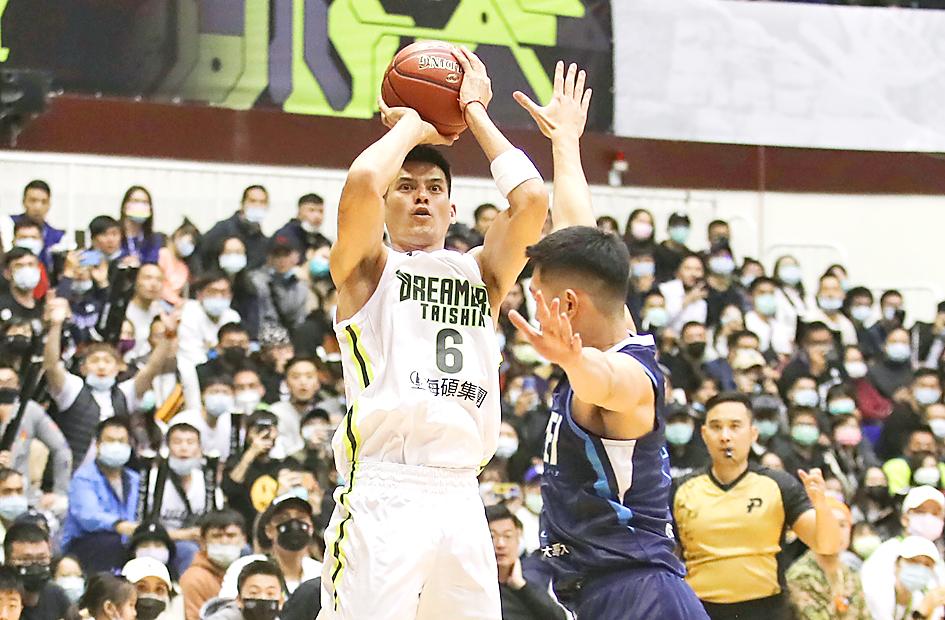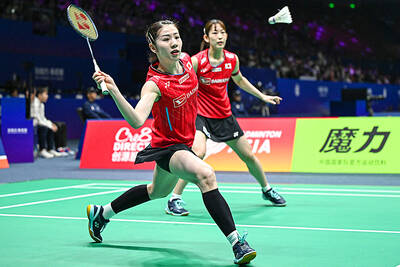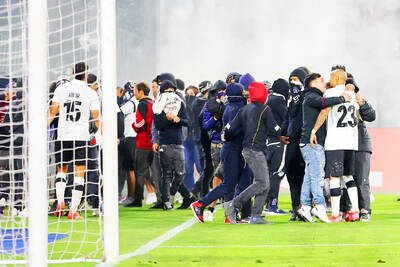When more than 6,000 spectators packed into Changhua County Stadium on Dec. 19 last year, they were there to witness a historic moment — the first professional basketball game in Taiwan since the shutdown of the Chinese Basketball Alliance (CBA) more than 20 years previously.
The game in Changhua was the official opener of Taiwan’s new four-team professional basketball league — the P.League+ — and it was won 89-86 by the visiting Taipei Fubon Braves over the Formosa Taishin Dreamers.
However, the final score was less important to the fans in attendance than the overall experience, featuring team mascots, pregame and halftime shows, and the chance to wear or hold team merchandise they could buy at the courtside fan shop.

Photo: CNA
The younger fans in attendance would not have remembered the last time a professional basketball game was held in Taiwan or that there even was a professional league from 1994 to 1999.
The CBA was the second professional basketball league set up in Asia after the Philippine Basketball Association and was very popular for a few years, often drawing sellout crowds.
However, in its fifth season in 1999, the league suspended operations due to a broadcasting rights dispute and the financial difficulties that beset companies sponsoring some of the six teams due to the 1997 financial crisis.
Since then, Taiwan has been without professional basketball. Filling the void has been the Super Basketball League (SBL), a semi-professional men’s basketball league founded in 2003 and run by the Chinese Taipei Basketball Association (CTBA).
The SBL enjoyed considerable popularity in its early years, but several factors conspired to erode that support. Among them are the lackluster advertising and marketing strategies used by the CTBA, which lacks the experience to build a truly professional operation, and the flight of many of Taiwan’s top players to China’s professional league, where salaries are double or triple those in Taiwan.
Those problems drove down attendances, leading some sponsors to pull out, and a league that once had seven teams now only has five.
That was why P.League+ founder and chief executive Blackie Chen, a TV personality and former CBA player, said that he felt Taiwan needed a real basketball league when he announced the P.League+’s formation in May last year.
“What we really need now is a professional basketball league. Even though many may think the SBL is Taiwan’s main league, it is not really a professional league,” Chen said.
A major difference with the SBL, where teams have corporate identities, is that the P.League+ focuses on the cities and arenas identified with a particular franchise, Chen said.
The Fubon Braves play in Taipei, the Dreamers play in Changhua County and the Taoyuan Pilots and Hsinchu JKO Lioneers are based in Taoyuan and Hsinchu, as their names suggest.
The teams have worked closely with their local governments to promote the new league, hoping to build a strong bond with local fans.
The SBL has tried for years to build this “home court” concept used by professional basketball leagues around the world, without success, but it has worked well so far for the P.League+, helped by the league’s professional marketing under 43-year-old Chen.
In the first 15 league games where fans were allowed to attend, seven have sold out and the attendance has averaged 6,068, higher than the 2019 average attendance of 5,800 fans for professional baseball, Taiwan’s No. 1 sport.
In contrast, the SBL opener for its 18th season drew only 1,500 fans and a game on Dec. 10 last year drew an embarrassingly low turnout of only 100.
Jerry Lin, a veteran public address announcer who has worked thousands of CBA and SBL games, said that he has high hopes for the new league, and praised its marketing team for creating a sense of anticipation around the league and its games.
Commentator Lee Yi-sheng agreed.
“The opening of the new league has created a buzz in basketball circles not seen for years,” and has given young Taiwanese players something to look up to, Lee said. “If the new league can offer more competitive salaries, I believe many top-level Taiwanese players will stay in Taiwan instead of playing across the [Taiwan] Strait.”
However, challenges still exist, as the CBA and SBL discovered after early optimism when they were founded.
The biggest is how the P.League+ can continue to live up to fans’ expectations and maintain their loyalty once the sense of novelty and excitement around the new league fades, pundits said.
Sports commentator Marc Tien, who worked on SBL games in its first 10 seasons, applauded the new league for “taking a brave first step” that could revive professional basketball in Taiwan.
However, what is important now is how each franchise continues to build a loyal home following and “listens to the voices of fans,” Tien said.
Also, with only four teams in the league, maintaining a competitive balance and preventing the emergence of one or two super teams that win all the time would be key, he said.
Taipei Fubon Braves coach Hsu Chin-che, who coached in the SBL for years, said that the league’s long-term viability would depend on fostering a willingness among fans to spend money to regularly attend games.
At the same time, the arrival of the P.League+ does not mean certain doom for the struggling SBL.
As a semi-professional league funded by the CTBA, the SBL is likely to continue operating for years to come, even if it cannot compete with the P.League+ at the box office, Lee said.
One of its advantages is the opportunity it gives to younger Taiwanese to play and grow their games, he said, much needed because the P.League+ allows two foreign imports to be on the court at the same time, limiting the chances for younger Taiwanese players to develop.
Whatever the future holds for the P.League+ and the SBL, there is no denying that the new professional basketball league has injected some much-needed vitality in Taiwan’s long-stagnant basketball scene.
Former Taiwan national team head coach Yen Chia-hua, now a consultant to five-time SBL champions Taiwan Beer, understands the potential pitfalls, but remains hopeful.
“After a long wait of 21 years, we finally have a new professional league. I hope the new league will create a new environment for basketball in Taiwan,” Yen said.

Japanese badminton star Chiharu Shida on Tuesday told Chinese fans to “stop stalking” her, adding that she was “very scared” by the unwanted attention. Shida, who won women’s doubles bronze at the Paris Olympics last year, has a strong following in China partly because of her engagement with the local culture. The 27-year-old, currently competing at the Badminton Asia Championships in Ningbo, China, has been dubbed the “Badminton Goddess” by fans and media. She hit out at some supporters on Tuesday, accusing them in an Instagram post of taking their fandom too far. “Every time we compete in China we always experience the harm

Two people died on Thursday after fans and police clashed outside the Estadio Monumental in Santiago ahead of a game in South America’s Copa Libertadores, Chilean authorities said. The fatalities happened shortly before the match between Chile’s Colo-Colo and Brazilian club Fortaleza, when police blocked about 100 fans when they attempted to enter the stadium. There were conflicting accounts of how the fatalities occurred, with local media reporting that one of the dead was a 13-year-old boy. The other victim was an 18-year-old woman, according to a relative at the hospital where she was treated. The fans died after being caught underneath a

A potential European league could be a gold mine for the NBA as the top-flight North American league looks to muscle its way into a deep pool of talent across the Atlantic Ocean. The NBA is exploring the launch of a European league with world basketball governing body FIBA as a partner, NBA commissioner Adam Silver said last week, with an eye toward a 16-team format made up of 12 permanent clubs and four qualifiers. The continent’s longstanding Euroleague quickly signaled its readiness to enter into talks with the NBA, even as it has balked at the idea of another league in

Tadej Pogacar on Sunday won an epic see-saw showdown at the Tour of Flanders, soloing home from 15km, with Mads Pedersen edging Mathieu van der Poel to second at the line a minute later with Wout van Aert fourth. The duel between the Slovenian and defending champion Van der Poel played out across the 17 hills in bright sunshine before Pogacar broke away. World champion Pogacar, who won the Giro d’Italia and the Tour de France last year, collected his eighth one-day Monument, moving ahead of one-day specialist Van der Poel on seven. “The goal was to win, but at